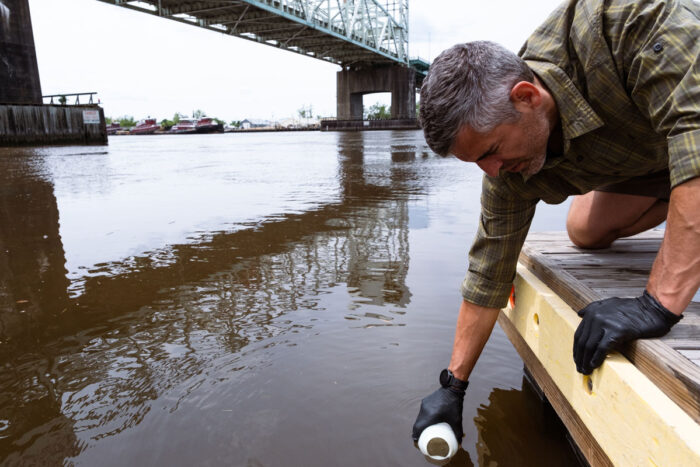First ever federal limits on PFAS in our drinking water
PFAS — or per- and polyfluoroalkyl substances — aren’t only known as “forever chemicals” because it’s a lot easier to pronounce. They’re called that because they never break down, and instead build up in our bodies and environment, causing harm over many years.
EPA’s recent action makes clear that these chemicals are dangerous, and do not belong in public drinking water.
Chris Bowers, Senior Attorney
This week, the Environmental Protection Agency announced long-awaited drinking water standards for six types of PFAS. The announcement came out of Fayetteville, North Carolina, where SELC has spent years working to stop toxic PFAS pollution that DuPont and its spin-off Chemours have released into the Cape Fear River and nearby communities for 40-plus years.

At the event attended by SELC staff and friends, EPA Administrator Michael Regan endorsed the importance of using existing laws to keep toxic pollution out of our waterways. The Clean Water Act already provides the tools necessary for agencies to stop PFAS pollution through the permitting process before it gets into drinking water sources.
“It’s pretty simple. If we can do that, we can keep PFAS pollution out of our drinking water sources in the first place,” says Senior Attorney Jean Zhuang, a water pollution expert on SELC’s Water Team. “This solution is well within our reach as we use our place-based approach to target some of the South’s most nefarious PFAS polluters.”
Here’s a snapshot of what that work has recently entailed across the region.
Duplin County, NC
Thanks to a draft permit the North Carolina Department of Environmental Quality issued to an automotive textile company, the major polluter known as Lear Corporation could possibly be allowed to release unlimited amounts of PFAS into the beloved Cape Fear River basin.

Polluting it with PFAS doesn’t only threaten the health of communities nearby, but also the residents and visitors who take to the northeast section of the river for fishing and kayaking.
“Lear told DEQ that it dumps large amounts of PFAS into our waters. Yet instead of taking steps to limit its pollution, DEQ has proposed that Lear simply monitor its toxic releases,” says Zhuang, who works out of SELC’s Chapel Hill office. “North Carolina communities have suffered enough from PFAS contamination. We need DEQ to shift course and begin putting limits in permits for industrial PFAS polluters throughout the state — starting with Lear.”
SELC submitted comments on behalf of community and environmental groups to urge the department to uphold the Clean Water Act and protect North Carolinians in the Cape Fear River basin by imposing limits on Lear’s PFAS discharges.
Calhoun, Georgia
A few hundred miles west, SELC is representing the Coosa River Basin Initiative in a federal lawsuit against the City of Calhoun, Georgia. We’re seeking to enforce the Clean Water Act and federal solid waste laws that prohibit waste handling and disposal that pose an “imminent and substantial” endangerment to health and the environment.
Calhoun’s wastewater treatment plant is polluting the region’s watershed with PFAS in two ways: discharging it directly into the Coosawattee River from a large sludge field upstream of one of the city’s main drinking water intakes, and contaminating groundwater with PFAS from previously dumped sludge.
We seek to hold the public wastewater treatment plant accountable for controlling PFAS pollution at its source as our laws require, keeping it out of our drinking water sources.

Calhoun’s second drinking water treatment plant draws source water from onsite groundwater wells and a natural freshwater spring near certain sludge application fields. Both of the city’s drinking water plants have reported PFAS based on agency testing in 2021. Although Calhoun leaders say they no longer dispose of sludge on the land and have implemented emergency interim measures, our suit alleges that surface water and groundwater PFAS contamination is ongoing.
“EPA’s recent action makes clear that these chemicals are dangerous, and do not belong in public drinking water,” says Senior Attorney Chris Bowers, a lead PFAS attorney in SELC’s Georgia office.
“Our enforcement suit seeks to address the underlying harm these chemicals cause by enforcing our bedrock environmental laws, which require controlling these pollutants at their source and taking bold action to remedy these harms,” he adds. “We urge Calhoun to join with CRBI in tackling the dangerous legacy of these toxic chemicals, so that the harm can be remedied.”
Columbia, South Carolina
PFAS from a carpet facility on the Lower Saluda River in Columbia, South Carolina, are also endangering the river and downstream communities.
The citizens of South Carolina deserve clean water, especially those in West Columbia and Cayce who rely on the river for drinking water.
Bill Stangler, Congaree Riverkeeper
Last month, SELC and the Riverkeeper warned carpet manufacturer Shaw Industries that its actions violate the Clean Water Act and Resource Conservation Recovery Act, and the groups plan to sue if the company fails to stop its illegal discharges of the forever chemicals.
Senior Associate Attorney Carl Brzorad, based in Charleston, concludes: “We won’t let Shaw pass off the burden of dealing with this PFAS pollution to those downstream – it has to stop.”
